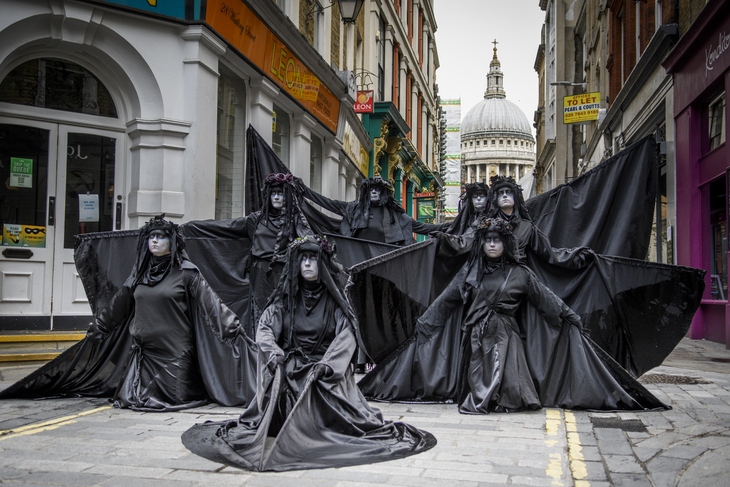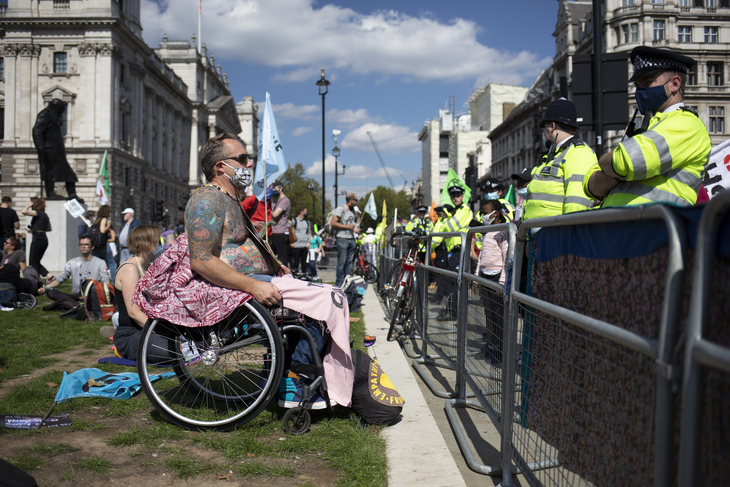
On 31 October 2018, Extinction Rebellion (XR) was launched in Westminster's Parliament Square, with the declaration: "We refuse to bequeath a dying planet to future generations by failing to act now."
Since then, the movement has rocked the capital time and time again, bringing Londoners' attention to the desperate state of the planet, via headline-grabbing demonstrations.
Here, Londonist speaks to Nuala Gathercole — who's worked in the Extinction Rebellion media team since early 2019 — about protesting, police bills - and how the pandemic got XR switching to Zoom.

London is a prime arena for grabbing people's attention, right?
London is the primary focus of our actions because it is the centre of political, media and financial power in the UK. If the media, the government and big business can ignore you they will, but in London they can't. They pay attention when people gather to protest in their back yard. It's as simple as that.

You've orchestrated many headline protests, including a 'takeover' of Tower Bridge. Which was most effective?
Extinction Rebellion is all about people power. We know that real change happens when a social movement becomes too big for government to ignore. In April 2019 over 10,000 people occupied the streets of central London day and night for 10 days running. Not long after our Parliament became the first in the world to declare a climate emergency and the UK came became the first country to sign a date to reach net zero carbon emissions into law.
As a movement we need to become too big for government and their friends in the fossil fuel industry to ignore. That's why we’re working to mobilise 100,000 in 2023.

What do you say to Londoners who claim you're disrupting their daily lives?
I think in 2018 it felt disingenuous to people when we said the disruption we are causing is nothing compared to what is down the line if we don't act to stop making the climate crisis worse.
Now, Londoners are experiencing record temperatures, emergency services struggling in the heat, wildfires and flooding on the tube. Most of that would have been unimaginable when we launched four years ago. It's clear to people the climate crisis is not a few generations down the line, it's not just elsewhere in the world. It's here and it's now.

Since July's record high temperatures, have you had more interest from people?
We've seen a massive uptick in interest from the public since the record breaking heatwave in July. We're regularly getting over a thousand people registering for our open zoom calls to find out how they can get involved in our plans beginning 10 September.

Have you found it trickier to cause disruption, since working from home became more of a thing?
It's not our end goal to stop people from getting to work, but disrupting central London is a necessary evil in order to make those in power sit up and pay attention to the climate crisis.
That said, the pandemic has made building a mass movement more challenging because you really need that magic of people getting in a room together. As restrictions lift we're regaining that momentum and, like everyone, we've moved some of our work onto Zoom.

Since the Canning Town tube incident, is public transport no longer a target?
There has been much reflection by everyone who took part in the action in Canning Town [a much-maligned attack on public transport by XR] and the wider movement, and lessons have been learned. I don't think anyone involved would make the choice to repeat what happened that day.

Sadiq Khan seems to be taking climate change quite seriously. What else should he be doing?
He should support the formation of a national Citizens' Assembly on climate and ecological justice. That's a representative sample of the UK population — ordinary people from all walks of life — armed with information provided by a range of experts.

Without enough action, what will the London of 2050 look like?
We're starting to hear more from the media about the extreme weather that results from a warming atmosphere but one of things the media hasn't done a good job of communicating is the social knock-on effects of this.
A heating planet has serious implications for our food and water supplies and you only have to take a quick look at the history books to know that no food on the shelves means social unrest and violence.

Has the new Policing Act dampened your ability to protest?
Legislation like the Policing Act and the proposed Public Order Bill are designed to have a chilling effect on protest. The government has really failed to read the room on this one. Recent polling found that eight out of 10 people in the UK are concerned about the climate crisis and over 50% think government plans are inadequate. Instead of taking action on the climate crisis, the government are trying to silence protestors, but the numbers of people ready to come out on the streets is growing, so they're fighting a losing battle.

What do you say to Londoners who want to get involved, but are put off by the thought of landing themselves in trouble?
Find your local XR group or come to one of our open zoom calls. You don't need to get arrested to get involved in XR, we have groups for families, young people, grandparents and more. There’s a role for everyone and everyone is needed.



